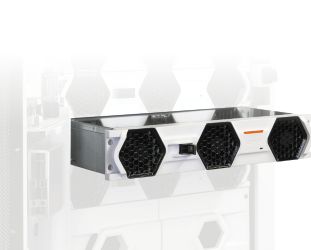Uptime Matters - The Critical Role of UPS Systems
Unplanned downtime is one of the biggest concerns faced by data center owners. According to the Uptime Institute’s Annual Outages Analysis 2024, power loss continues to be a significant issue in the industry, responsible for 52% of all outages, causing substantial financial consequences. Despite technological advancements offering operators the potential to improve resiliency, The Uptime institutes’ Global Data Center Survey 2024 reports that whilst there have been gradual improvements, outrages remain a critical issue for operators.

Understandably, data center outages are complex, often affecting multiple systems, and are difficult to track. Yet interestingly, Uptime’s survey revealed that four in five operators believed their most recent significant downtime incidents were preventable with better management, processes, or configuration in place. This begs the question: Why aren’t these avoidable failures being addressed more proactively?
The risks associated with downtime extend beyond immediate financial losses. Repeated or prolonged outages can damage a data center's reputation, erode customer trust, and potentially result in the loss of business. In today’s environment, uptime is increasingly critical due to the demands of cloud services, AI, and big data applications; ensuring consistent and reliable power is non-negotiable. This reality underscores the importance of a robust, well-maintained, uninterruptible power supply (UPS) system as a cornerstone of any data center’s risk management strategy.
The Role of Modular UPS Systems
Modular UPS technology is gaining popularity for its flexibility and scalability. Operators can install only what is needed, avoiding oversizing UPS and thereby reducing initial space and costs. Fully expandable, these solutions are simple, efficient, and reliable. They not only address the growing need to protect against downtime but also provide greater total cost of ownership (TCO).
In addition to providing flexibility, modular UPS systems offer other significant advantages. Their modularity allows for easy upgrades, ensuring that data centers can scale their power infrastructure without needing to overhaul the entire system. This approach saves costs and minimizes disruption, allowing for seamless expansion as demand grows.

Key Steps to Ensuring Long-Term UPS Performance
To ensure long-term, optimum performance from an uninterruptible power supply, data center operators should consider the following key steps:
Capacity Planning: Ensure the UPS system is appropriately sized to handle current and future loads. This requires thorough planning and an understanding of the data center’s growth trajectory.
Redundancy: Implement redundancy in your UPS configuration to provide backup power in case of a failure. This can include N+1 or 2N designs, depending on the criticality of the data center operations.
Regular Maintenance: Establish a proactive maintenance schedule to inspect, test, and replace critical components as needed. Regular maintenance reduces the risk of unexpected failures and extends the lifespan of the UPS system.
Firmware Updates: Keep the UPS firmware up to date to ensure the system is operating with the latest improvements and security patches. This is crucial for maintaining optimal performance and mitigating vulnerabilities.
Environmental Monitoring: Implement environmental monitoring to track factors such as temperature, humidity, and air quality around the UPS. These variables can impact UPS performance and should be maintained within optimal ranges.
Training and Procedures: Ensure that staff are properly trained in UPS operation and emergency procedures. Having well-documented and practiced procedures in place can make a significant difference in managing unexpected events.
Sustainable Partners: Collaborate with suppliers who prioritize sustainability in their products and operations. Choose UPS systems from manufacturers committed to reducing environmental impact, using eco-friendly materials, maintaining energy-efficient production, and offering recycling programs for end-of-life equipment.
As data center power, space and connectivity become strained by the demands of generative AI and other high-density applications, incorporating and maintaining resilient, flexible, scalable and space-saving infrastructure is critical. By investing in advanced UPS systems and adopting a proactive approach to maintenance and management, data centers can significantly reduce the risk of power-related outages and ensure continuous operation, safeguarding their infrastructure and investments.
Legrand’s Modular UPS Solutions

Legrand offers modular solutions that are ideal for a variety of applications and can be configured to provide redundancy for all tiers of data centers. These solutions are designed to adapt to the changing demands of data centers, ensuring efficiency and reliability while minimizing the risk of downtime.
























 Canada
Canada
 Latin America (English)
Latin America (English)
 Latin America (Espanol)
Latin America (Espanol)
 USA
USA
 China
China
 India
India
 Japan
Japan
 Republic of Korea
Republic of Korea
 South East Asia (English)
South East Asia (English)
 Austria
Austria
 Belgium
Belgium
 France
France
 Germany
Germany
 Italy
Italy
 Netherlands
Netherlands
 Spain
Spain
 Switzerland
Switzerland
 Turkey
Turkey
 UK
UK
 Africa (english)
Africa (english)
 Africa (français)
Africa (français)
 Middle East (english)
Middle East (english)
 Australia
Australia
 New Zealand
New Zealand






